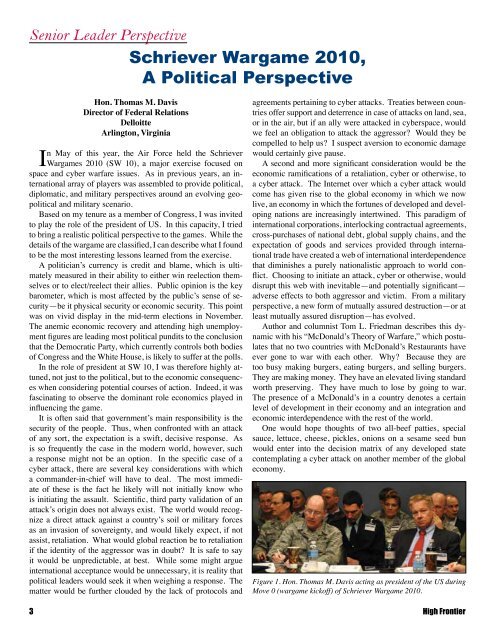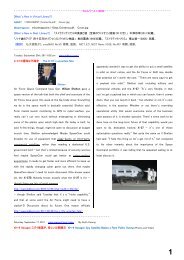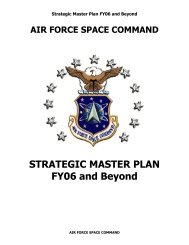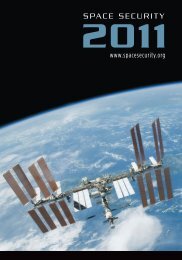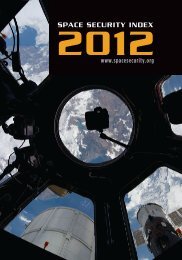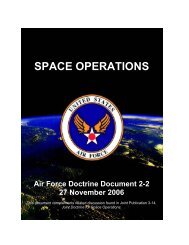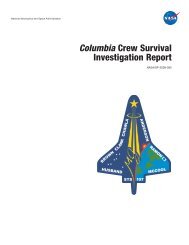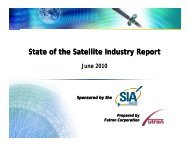Schriever Wargame 2010 - Air Force Space Command
Schriever Wargame 2010 - Air Force Space Command
Schriever Wargame 2010 - Air Force Space Command
Create successful ePaper yourself
Turn your PDF publications into a flip-book with our unique Google optimized e-Paper software.
Senior Leader Perspective<br />
<strong>Schriever</strong> <strong>Wargame</strong> <strong>2010</strong>,<br />
A Political Perspective<br />
Hon. Thomas M. Davis<br />
Director of Federal Relations<br />
Delloitte<br />
Arlington, Virginia<br />
In May of this year, the <strong>Air</strong> <strong>Force</strong> held the <strong>Schriever</strong><br />
<strong>Wargame</strong>s <strong>2010</strong> (SW 10), a major exercise focused on<br />
space and cyber warfare issues. As in previous years, an international<br />
array of players was assembled to provide political,<br />
diplomatic, and military perspectives around an evolving geopolitical<br />
and military scenario.<br />
Based on my tenure as a member of Congress, I was invited<br />
to play the role of the president of US. In this capacity, I tried<br />
to bring a realistic political perspective to the games. While the<br />
details of the wargame are classified, I can describe what I found<br />
to be the most interesting lessons learned from the exercise.<br />
A politician’s currency is credit and blame, which is ultimately<br />
measured in their ability to either win reelection themselves<br />
or to elect/reelect their allies. Public opinion is the key<br />
barometer, which is most affected by the public’s sense of security—be<br />
it physical security or economic security. This point<br />
was on vivid display in the mid-term elections in November.<br />
The anemic economic recovery and attending high unemployment<br />
figures are leading most political pundits to the conclusion<br />
that the Democratic Party, which currently controls both bodies<br />
of Congress and the White House, is likely to suffer at the polls.<br />
In the role of president at SW 10, I was therefore highly attuned,<br />
not just to the political, but to the economic consequences<br />
when considering potential courses of action. Indeed, it was<br />
fascinating to observe the dominant role economics played in<br />
influencing the game.<br />
It is often said that government’s main responsibility is the<br />
security of the people. Thus, when confronted with an attack<br />
of any sort, the expectation is a swift, decisive response. As<br />
is so frequently the case in the modern world, however, such<br />
a response might not be an option. In the specific case of a<br />
cyber attack, there are several key considerations with which<br />
a commander-in-chief will have to deal. The most immediate<br />
of these is the fact he likely will not initially know who<br />
is initiating the assault. Scientific, third party validation of an<br />
attack’s origin does not always exist. The world would recognize<br />
a direct attack against a country’s soil or military forces<br />
as an invasion of sovereignty, and would likely expect, if not<br />
assist, retaliation. What would global reaction be to retaliation<br />
if the identity of the aggressor was in doubt? It is safe to say<br />
it would be unpredictable, at best. While some might argue<br />
international acceptance would be unnecessary, it is reality that<br />
political leaders would seek it when weighing a response. The<br />
matter would be further clouded by the lack of protocols and<br />
agreements pertaining to cyber attacks. Treaties between countries<br />
offer support and deterrence in case of attacks on land, sea,<br />
or in the air, but if an ally were attacked in cyberspace, would<br />
we feel an obligation to attack the aggressor? Would they be<br />
compelled to help us? I suspect aversion to economic damage<br />
would certainly give pause.<br />
A second and more significant consideration would be the<br />
economic ramifications of a retaliation, cyber or otherwise, to<br />
a cyber attack. The Internet over which a cyber attack would<br />
come has given rise to the global economy in which we now<br />
live, an economy in which the fortunes of developed and developing<br />
nations are increasingly intertwined. This paradigm of<br />
international corporations, interlocking contractual agreements,<br />
cross-purchases of national debt, global supply chains, and the<br />
expectation of goods and services provided through international<br />
trade have created a web of international interdependence<br />
that diminishes a purely nationalistic approach to world conflict.<br />
Choosing to initiate an attack, cyber or otherwise, would<br />
disrupt this web with inevitable—and potentially significant—<br />
adverse effects to both aggressor and victim. From a military<br />
perspective, a new form of mutually assured destruction—or at<br />
least mutually assured disruption—has evolved.<br />
Author and columnist Tom L. Friedman describes this dynamic<br />
with his “McDonald’s Theory of Warfare,” which postulates<br />
that no two countries with McDonald’s Restaurants have<br />
ever gone to war with each other. Why? Because they are<br />
too busy making burgers, eating burgers, and selling burgers.<br />
They are making money. They have an elevated living standard<br />
worth preserving. They have much to lose by going to war.<br />
The presence of a McDonald’s in a country denotes a certain<br />
level of development in their economy and an integration and<br />
economic interdependence with the rest of the world.<br />
One would hope thoughts of two all-beef patties, special<br />
sauce, lettuce, cheese, pickles, onions on a sesame seed bun<br />
would enter into the decision matrix of any developed state<br />
contemplating a cyber attack on another member of the global<br />
economy.<br />
Figure 1. Hon. Thomas M. Davis acting as president of the US during<br />
Move 0 (wargame kickoff) of <strong>Schriever</strong> <strong>Wargame</strong> <strong>2010</strong>.<br />
3 High Frontier


